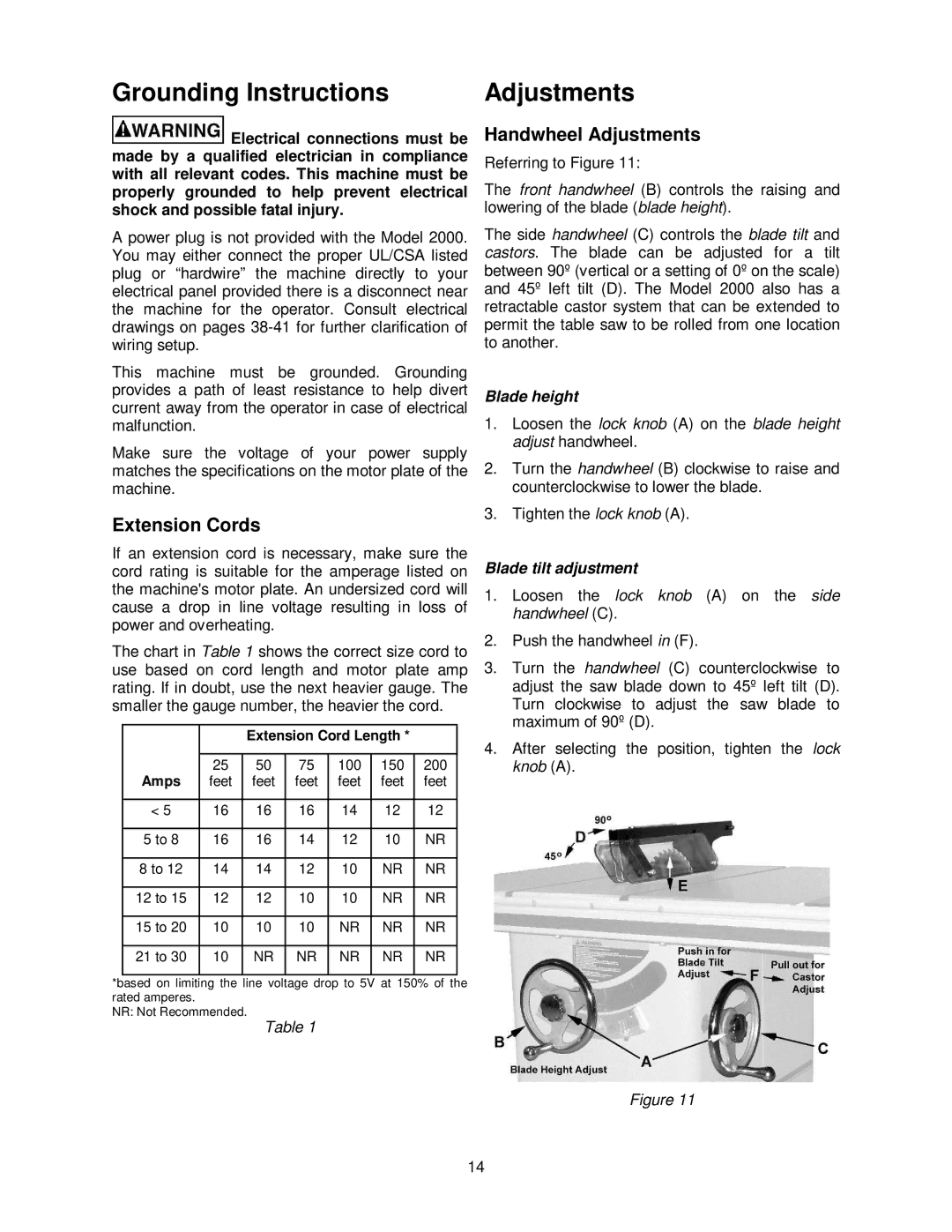
Grounding Instructions
![]() Electrical connections must be made by a qualified electrician in compliance with all relevant codes. This machine must be properly grounded to help prevent electrical shock and possible fatal injury.
Electrical connections must be made by a qualified electrician in compliance with all relevant codes. This machine must be properly grounded to help prevent electrical shock and possible fatal injury.
A power plug is not provided with the Model 2000. You may either connect the proper UL/CSA listed plug or “hardwire” the machine directly to your electrical panel provided there is a disconnect near the machine for the operator. Consult electrical drawings on pages
This machine must be grounded. Grounding provides a path of least resistance to help divert current away from the operator in case of electrical malfunction.
Make sure the voltage of your power supply matches the specifications on the motor plate of the machine.
Extension Cords
If an extension cord is necessary, make sure the cord rating is suitable for the amperage listed on the machine's motor plate. An undersized cord will cause a drop in line voltage resulting in loss of power and overheating.
The chart in Table 1 shows the correct size cord to use based on cord length and motor plate amp rating. If in doubt, use the next heavier gauge. The smaller the gauge number, the heavier the cord.
|
|
| Extension Cord Length * |
| |||
|
|
|
|
|
|
|
|
Amps | 25 | 50 | 75 | 100 | 150 | 200 | |
feet | feet | feet | feet | feet | feet | ||
|
|
|
|
|
|
|
|
< 5 |
| 16 | 16 | 16 | 14 | 12 | 12 |
|
|
|
|
|
|
|
|
5 to | 8 | 16 | 16 | 14 | 12 | 10 | NR |
|
|
|
|
|
|
| |
8 to 12 | 14 | 14 | 12 | 10 | NR | NR | |
|
|
|
|
|
|
|
|
12 to | 15 | 12 | 12 | 10 | 10 | NR | NR |
|
|
|
|
|
|
|
|
15 to | 20 | 10 | 10 | 10 | NR | NR | NR |
|
|
|
|
|
|
|
|
21 to | 30 | 10 | NR | NR | NR | NR | NR |
|
|
|
|
|
|
|
|
*based on limiting the line voltage drop to 5V at 150% of the rated amperes.
NR: Not Recommended.
Table 1
Adjustments
Handwheel Adjustments
Referring to Figure 11:
The front handwheel (B) controls the raising and lowering of the blade (blade height).
The side handwheel (C) controls the blade tilt and castors. The blade can be adjusted for a tilt between 90º (vertical or a setting of 0º on the scale) and 45º left tilt (D). The Model 2000 also has a retractable castor system that can be extended to permit the table saw to be rolled from one location to another.
Blade height
1.Loosen the lock knob (A) on the blade height adjust handwheel.
2.Turn the handwheel (B) clockwise to raise and counterclockwise to lower the blade.
3.Tighten the lock knob (A).
Blade tilt adjustment
1.Loosen the lock knob (A) on the side handwheel (C).
2.Push the handwheel in (F).
3.Turn the handwheel (C) counterclockwise to adjust the saw blade down to 45º left tilt (D). Turn clockwise to adjust the saw blade to maximum of 90º (D).
4.After selecting the position, tighten the lock knob (A).
Figure 11
14
